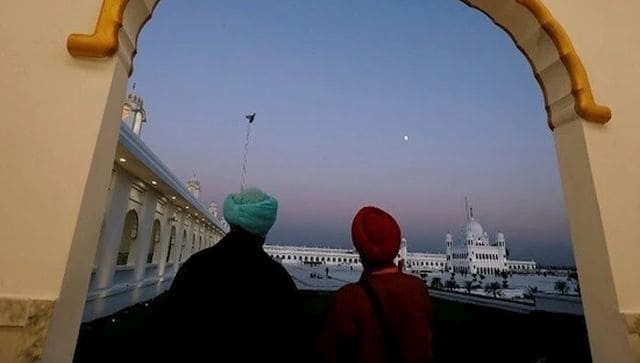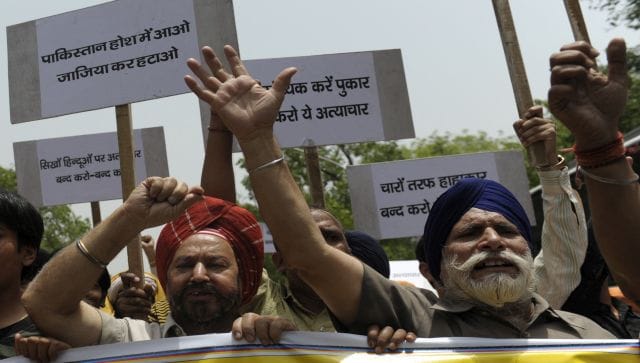Pakistan is a dangerous country. It’s even more unsafe for religious minorities who continue to face discrimination and are regularly targeted. There has been an increase in the attack on Sikhs in the neighbouring nation in recent months, prompting India to intervene. The government on Monday summoned a senior Pakistani diplomat to the External Affairs Ministry and lodged a strong protest over the recent attacks on the
Sikh community
. There have been at least such four killings in Pakistan between April and June. The Indian government expressed its concern to the diplomat from the Pakistan high commission in New Delhi. “India has demanded that Pakistani authorities investigate the violent attacks on the Sikh community with sincerity and share investigation reports,” a source told news agency PTI. “It has also been conveyed that Pakistan should ensure the safety and security of its minorities who live in constant fear of religious persecution,” the source added. The recent attacks on Sikhs Last week, gunmen shot and killed a Sikh man in the northwestern city of Peshawar. According to the police, the attack on Manmohan Singh, 35, appeared to be a targeted killing. The Islamic State group in a statement claimed responsibility for the killing, saying Singh had been a follower of what it called a “polytheistic” Sikh sect in Peshawar. It also claimed that it wounded another member of the community in the northwestern city a day earlier. These are not isolated incidents. Last month, assailants gunned down Sardar Singh in a drive-by shooting in the eastern city of Lahore. In April, gunmen shot and killed Dayal Singh in Peshawar. In the same city in May 2022, gunmen killed two members of the Sikh community, reports The Associated Press. Also read: Decoding why minorities in Bangladesh and Pakistan continue to face persecution
A fight for identity Sikhs are among the smallest minority groups in Pakistan. In the country’s 2017 census report, they were listed as “Others” with a percentage of 0.07. However, in December 2022, the Pakistan Statistics Bureau announced that census forms will have a column for the community. This came after a five-year court battle started by five Sikhs who filed a petition in a Peshawar court in 2017. The court ruled in their favour but no action was taken. The Supreme Court then intervened and ordered a separate column for Sikhs in the census forms. While the move might give Pakistani Sikhs representation in institutions, it has done little to stop discrimination. [caption id=“attachment_12793952” align=“alignnone” width=“640”] The population of Sikhs in Pakistan is on decline. According to Pakistan Sikh Gurdwara Prabandhak Committee, there are just 15,000-20,000 Sikhs. File photo/Reuters[/caption] The persecution of Sikhs Last December, Pakistan was designated as a “country of particular concern” under the Religious Freedom Act by the United States because of its flagrant violations. The Act mandates that countries be designated such if they are found to breach religious freedoms systematically and consistently, according to a report in the news agency ANI. Pakistan, on paper, guarantees freedom of religion. But there is growing intolerance against minorities in the country. The narrative that Sikhs are relatively safe in Pakistan is false. The Sikhs in the country are not mostly Punjabis – they are either Pashthuns or Sindhis. And attacks on them have become a regular affair. There have been several targeted killings in the Khyber Pakhtunkhwa (KPK). From 2014 to 2022, there were at least 12 such incidents where Sikhs were attacked by extremists in Peshawar and the surrounding districts of the province. The Sikhs in Khyber Pakhtunkhwa trace their roots to the times when the region was part of Afghanistan. During British rule, Peshawar and other northwestern districts of Punjab were part of the North-Western Frontier Province, which went to Pakistan after the partition. In 2010, it was renamed ‘Khyber Pakhtunkhwa’ by the Pakistan government on demand of the Paktun population that speaks Pashto. The Pashtun Sikhs settled in the province in the districts of Kurram, Khyber and Orakzai, the erstwhile Federally Administered Tribal Areas (FATA) on the border of Afghanistan-Pakistan border, which merged into KPK in 2018, according to a report in The Indian Express. But as persecution of religious minorities increased they moved to cities like Peshawar, Lahore and Nankana Sahib, which they considered safer. Most Sikhs in the region are from lower-income families and run small shops that sell groceries, spices and medicines. They consider themselves Pakistanis and live in harmony with Muslims. “There is no fear of law. Sikhs are shot dead simply because they are religious minorities. This persecution of Sikhs has to stop. Each Sikh living in Pakistan loves their country very much, we are proud of being Pakistanis but then our people are being shot dead every other day without any fear,” Balbir Singh, a local gurudwara sewadar-cum-school teacher, told The Indian Express after people from the community were murdered by the Islamic State’s Afghanistan affiliate, dubbed Islamic State Khorasan last year. [caption id=“attachment_12793982” align=“alignnone” width=“640”]
The population of Sikhs in Pakistan is on decline. According to Pakistan Sikh Gurdwara Prabandhak Committee, there are just 15,000-20,000 Sikhs. File photo/Reuters[/caption] The persecution of Sikhs Last December, Pakistan was designated as a “country of particular concern” under the Religious Freedom Act by the United States because of its flagrant violations. The Act mandates that countries be designated such if they are found to breach religious freedoms systematically and consistently, according to a report in the news agency ANI. Pakistan, on paper, guarantees freedom of religion. But there is growing intolerance against minorities in the country. The narrative that Sikhs are relatively safe in Pakistan is false. The Sikhs in the country are not mostly Punjabis – they are either Pashthuns or Sindhis. And attacks on them have become a regular affair. There have been several targeted killings in the Khyber Pakhtunkhwa (KPK). From 2014 to 2022, there were at least 12 such incidents where Sikhs were attacked by extremists in Peshawar and the surrounding districts of the province. The Sikhs in Khyber Pakhtunkhwa trace their roots to the times when the region was part of Afghanistan. During British rule, Peshawar and other northwestern districts of Punjab were part of the North-Western Frontier Province, which went to Pakistan after the partition. In 2010, it was renamed ‘Khyber Pakhtunkhwa’ by the Pakistan government on demand of the Paktun population that speaks Pashto. The Pashtun Sikhs settled in the province in the districts of Kurram, Khyber and Orakzai, the erstwhile Federally Administered Tribal Areas (FATA) on the border of Afghanistan-Pakistan border, which merged into KPK in 2018, according to a report in The Indian Express. But as persecution of religious minorities increased they moved to cities like Peshawar, Lahore and Nankana Sahib, which they considered safer. Most Sikhs in the region are from lower-income families and run small shops that sell groceries, spices and medicines. They consider themselves Pakistanis and live in harmony with Muslims. “There is no fear of law. Sikhs are shot dead simply because they are religious minorities. This persecution of Sikhs has to stop. Each Sikh living in Pakistan loves their country very much, we are proud of being Pakistanis but then our people are being shot dead every other day without any fear,” Balbir Singh, a local gurudwara sewadar-cum-school teacher, told The Indian Express after people from the community were murdered by the Islamic State’s Afghanistan affiliate, dubbed Islamic State Khorasan last year. [caption id=“attachment_12793982” align=“alignnone” width=“640”] Members of the World Hindu Federation take part in a protest against atrocities committed against Sikhs in Pakistan’s northwest region by the Taliban, in New Delhi. File photo/AFP[/caption] The rise of Taliban and other terror groups in the tribal areas and Khyber Pakhtunkhwa proved to be dangerous for Sikhs. In interior Sindh, religious extremism saw a rise during the regime of General Pervez Musharaff. Many look at Sikhs as “killers” of Muslims, who migrated from India. It does not help that the educational curricula propagate this narrative. Targeted killings, violence, and arson in non-Muslim neighbourhoods are common. Forced conversions and accusations of blasphemy followed by lynchings or imprisonment are the reality of Sikh minorities in the country. The Sikh population in Pakistan is in a vulnerable state and has seen a massive decline in the last two decades amid rising cases of forced conversions and targeted attacks by Islamic outfits because of their unique religious identifications. According to Pakistan Sikh Gurdwara Prabandhak Committee, there are just 15,000 to 20,000 Sikhs estimated to be left in Pakistan of which some 500 Sikh households are in Peshawar. The growing demands to impose Sharia laws in the country and the rise in atrocities have made it difficult for Sikhs to survive in the country. Religious minorities are treated as second-class citizens and this community is seeing the worst of it. With inputs from agencies Read all the Latest News
, Trending News
,
Cricket News
, Bollywood News
, India News
and Entertainment News
here. Follow us on
Facebook
,
Twitter
and
Instagram
.
Members of the World Hindu Federation take part in a protest against atrocities committed against Sikhs in Pakistan’s northwest region by the Taliban, in New Delhi. File photo/AFP[/caption] The rise of Taliban and other terror groups in the tribal areas and Khyber Pakhtunkhwa proved to be dangerous for Sikhs. In interior Sindh, religious extremism saw a rise during the regime of General Pervez Musharaff. Many look at Sikhs as “killers” of Muslims, who migrated from India. It does not help that the educational curricula propagate this narrative. Targeted killings, violence, and arson in non-Muslim neighbourhoods are common. Forced conversions and accusations of blasphemy followed by lynchings or imprisonment are the reality of Sikh minorities in the country. The Sikh population in Pakistan is in a vulnerable state and has seen a massive decline in the last two decades amid rising cases of forced conversions and targeted attacks by Islamic outfits because of their unique religious identifications. According to Pakistan Sikh Gurdwara Prabandhak Committee, there are just 15,000 to 20,000 Sikhs estimated to be left in Pakistan of which some 500 Sikh households are in Peshawar. The growing demands to impose Sharia laws in the country and the rise in atrocities have made it difficult for Sikhs to survive in the country. Religious minorities are treated as second-class citizens and this community is seeing the worst of it. With inputs from agencies Read all the Latest News
, Trending News
,
Cricket News
, Bollywood News
, India News
and Entertainment News
here. Follow us on
Facebook
,
Twitter
and
Instagram
.
4 attacks in 3 months: How Pakistan is becoming increasingly unsafe for Sikhs
FP Explainers
• June 27, 2023, 13:29:55 IST
India summoned a Pakistani diplomat and lodged a strong protest over the recent attacks on Sikhs in the neighbouring nation. The rise in terror groups and the growing demand to impose Sharia law in the country have led to the community being targeted
Advertisement
)
End of Article